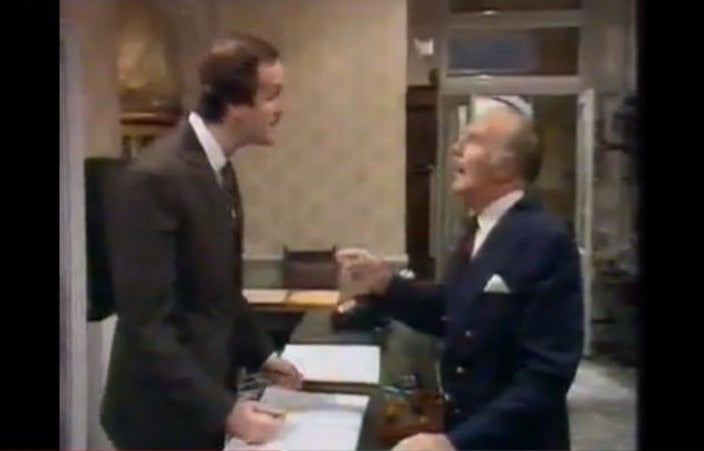Why the BBC’s decision to muzzle the Major was far from Fawlty
The broadcaster must think of its audience over "completist" concerns. Plus, the joys of an underwhelming exhibit at the British Library

As I wrote last week, Radio 4 will shortly broadcast the complete text of Tony Harrison’s poem V, which caused something of a fuss at the time of its first publication because of its faithful transmission of the obscene graffiti in a Leeds cemetery. Now it seems, late at night and with a certain amount of advance warning, the C-word and the F-word will be admitted to the Royal Enclosure of the broadcastable affront.
Over at the other end of the paddock, though, the stewards have just escorted another word out. And though they did it without fuss some people have noticed and are making a fuss anyway. The fact that racial epithets have been edited out of an old episode of Fawlty Towers – the one in which the Major reveals just how behind the times he is in terms of racial politesse – has been greeted in some quarters as a prim excess of nicety on the BBC’s part.
I confess my first instinct was to agree with the complainants. The scene in question mocks racism rather than endorsing it and generally speaking it’s a bad idea to pretend that the past was a nicer place than was actually the truth. The BBC is also sometimes twitchily over-responsive to potential rather than actual public distress (as in its decision to remove the Jimmy Savile episode of Desert Island Discs from its online archive rather than simply acknowledge that it was recorded in different circumstances). Surely, I thought, the audience is adult enough to be able to judge the intention and the nuances of the scene in question. And then I read a newspaper report on the matter and thought that it might be a little more complicated than I’d first assumed.
The offending term is one I don’t even much like typing out – “nigger”, a word that brings quite enough complications in its wake at the best of times, as the fuss over Quentin Tarantino’s Django Unchained has just reminded us. But the further complication here was that this episode was due to go out at 7.30pm, at a time when a lot of young children might be assumed to be watching, with their parents or alone. And although there’s nothing inherently wrong with children learning that social attitudes change and grown-ups get things wrong, you might feel as a parent that there are better times to do it than in the middle of something you’ve turned on for a bit of light relief. Weighing up the completist outrage of the fans who’ve seen this episode many times already and find this moment “classic”, against the discomfort of those who only wanted to watch a comedy, I’m inclined to think the BBC got it right.
Oddly, this incident chimed with a reticence about the word that seemed to me to be genuinely regrettable. Watching Spielberg’s Lincoln the other day, I found myself wondering what it would feel like if we were to see that secular saint employing the term, as there’s historical evidence that he did at times. Unthinkable, of course, in a film that wants us to revere him.
The word is used in the film, but almost exclusively by anti-abolitionist politicians. So their palpable wrongness (by our current lights) makes safe the ugliness of the term. But how disruptively confusing it would be to hear it in the mouth of the film’s hero, even though that jolt might convey something of the complexity of Lincoln’s journey from theoretical opposition to slavery to something more heartfelt and inward.
I wish Tony Kushner had dared, just as I wish he’d acknowledged the existence of black activists such as Frederic Douglass. There are times when an audience needs a bit of a bit of a jolt. I’m not sure that 7.30 in the evening, when all you want is a laugh, is one of them.
In praise of small wonders...
My heart sank a little as I went into the British Library’s Murder in the Library exhibition. We were planning to discuss it on the radio and it was so modest in scale that I wondered whether it would even justify the tube fares for the guests. Consisting of just 26 small display cases, it offers an alphabetical exploration of crime fiction, from Agatha Christie to Zodiac. And at first glance, it looked a tiny bit thin. In fact, it makes an excellent case for the micro-exhibition: full of intriguing bits of memorabilia and, far more importantly, entirely absorbable. It made me feel that “underwhelmed” should occasionally be a term of praise.

Join our commenting forum
Join thought-provoking conversations, follow other Independent readers and see their replies